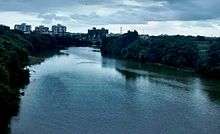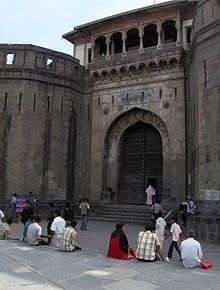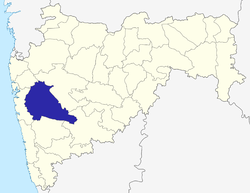Pavana River
| Pavana River | |
|---|---|
 Pavana River at Ravet | |
| Native name | पवना नदी |
| Country | India |
| Basin | |
| Main source |
Western Ghats 650 m (2,130 ft) |
| River mouth | Mula River |
| Physical characteristics | |
| Length | 58 km (36 mi) |
The Pavana River is a notable river crossing the cities of Pimpri-Chinchwad and Pune in the Indian state of Maharashtra. The river originates south of Lonavala from the Western Ghats, and flows a total of nearly 60 kilometres (37 mi) to meet the Mula river in Pune.
Geology
Pavana River originates from the Western Ghats, about 6 km (3.7 mi) south of Lonavala. Flowing eastwards initially, it becomes southbound and passes through the suburbs of Dehu, Chinchwad, Pimpri and Dapodi before its confluence with the Mula river near Sangvi.
An earthfill gravity dam forms the Pavana reservoir. The dam, constructed in 1972, is 1,329 m (4,360 ft) long and 42.37 m (139.0 ft) high, with a gross storage capacity of 30,500.00 km3 (7,317.34 cu mi).[1]
Environmental Degradation
The river is reported to be severely polluted, causing the civic activists to blame the governing body for not taking appropriate steps to limit the degradation. Accumulation of silt and discharge of untreated industrial waste are the major factors of pollution of the river, and has made the river water unusable.[2]
References
- ↑ Central Water Commission. "Specifications of large dams in India" (PDF). Central Water Commission. Retrieved 4 May 2014.
- ↑ Express News Service (18 July 2013). "Pavana river is highly polluted: PCMC report". The Indian Express. Retrieved 4 May 2014.
Coordinates: 18°34′N 73°50′E / 18.567°N 73.833°E

